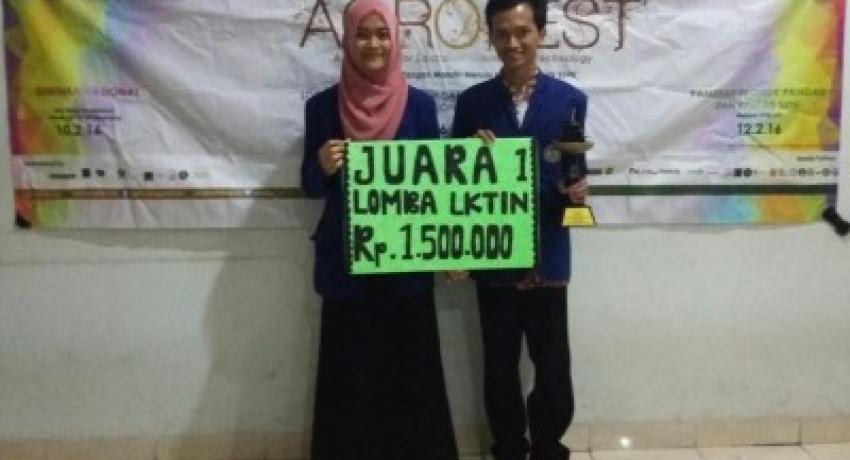Students of Faculty of Mathematics and Science (FMS), Yogyakarta State University (YSU), managed to obtain a satisfactory result in the event of 2016 National Scientific Writing Competition Agrofest at the Education University of Indonesia (EUI). The students are Herianto (Natural Science Education), May Rina Nuraini (Chemistry), and Mutiara Khalida (Mathematics Education). The collaboration of these departments successfully result in the winning of the first prize, while the runner-up was achieved by the host that is EUI, and the third prize was won by the University of Padjadjaran.
The 2016 National Scientific Essay Contest Agrofest was organized by Agro-Industry Student Association, EUI. The event brought the theme “Food Security to the Indonesia Golden Era 2045”. The final round of the contest was held at the Faculty of Educational Technology and Vocational (12/2). The team leader, Herianto conveyed a sense of pride in the work of the finalists. "Finalists in this event have shown remarkable work, it was difficult to predict who would come out as the winner. With the permission of Allah, God blessed FMS YSU team to succeed in obtaining the first position. "
At the event, three students of FMS presented a paper entitled `Application of Photocatalyst Zink Oxide in the Glass Cabinet Container of Vegetables to Degrade Pesticide Residues and Preserve Vegetables`. According to the team, the use of pesticides to exterminate pest can be hazardous for human health because pesticides can be absorbed by plants and can be consumed by humans through food. Pesticide residues may cause effects in the long term that can lead to health problems such as disorders of the nervous system and metabolic enzymes.
Management of post-harvest vegetables also needs to be considered; it is because vegetables have nonperishable characters due to their growth and activity of microorganisms that cause decay. For this reason, the three students developed zinc oxide-based photocatalyst vegetables storage cupboard to degrade pesticide residue as well as to impede the growth of microorganisms that cause decay, hence, making the vegetables become more long-lasting.
Degradation of pesticide residues can be done by using materials made of oxide semiconductors such as zinc oxide (ZnO). This material can absorb photons and initiate the oxidation-reduction reaction (redox) that breaks down complex organic molecules into simpler molecules. Through photocatalyst, pesticide residue is converted into harmless components and useful for the environment, such as in the form of minerals, CO2, N2, and water. ZnO is a trace of metal that is essential to metaloenzim which has high biological activity and can be used to obstruct bacterial growth effectively. With their anti-bacterial activity, vegetables will become more long-lasting and not easily spoiled. (Mayrina)





